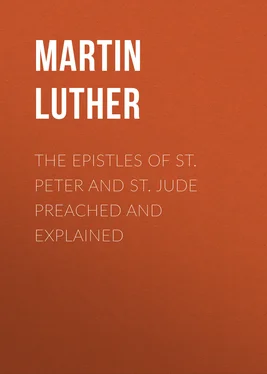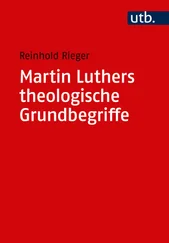Martin Luther - The Epistles of St. Peter and St. Jude Preached and Explained
Здесь есть возможность читать онлайн «Martin Luther - The Epistles of St. Peter and St. Jude Preached and Explained» — ознакомительный отрывок электронной книги совершенно бесплатно, а после прочтения отрывка купить полную версию. В некоторых случаях можно слушать аудио, скачать через торрент в формате fb2 и присутствует краткое содержание. Жанр: foreign_prose, foreign_religion, Философия, foreign_psychology, foreign_antique, на немецком языке. Описание произведения, (предисловие) а так же отзывы посетителей доступны на портале библиотеки ЛибКат.
- Название:The Epistles of St. Peter and St. Jude Preached and Explained
- Автор:
- Жанр:
- Год:неизвестен
- ISBN:нет данных
- Рейтинг книги:5 / 5. Голосов: 1
-
Избранное:Добавить в избранное
- Отзывы:
-
Ваша оценка:
- 100
- 1
- 2
- 3
- 4
- 5
The Epistles of St. Peter and St. Jude Preached and Explained: краткое содержание, описание и аннотация
Предлагаем к чтению аннотацию, описание, краткое содержание или предисловие (зависит от того, что написал сам автор книги «The Epistles of St. Peter and St. Jude Preached and Explained»). Если вы не нашли необходимую информацию о книге — напишите в комментариях, мы постараемся отыскать её.
The Epistles of St. Peter and St. Jude Preached and Explained — читать онлайн ознакомительный отрывок
Ниже представлен текст книги, разбитый по страницам. Система сохранения места последней прочитанной страницы, позволяет с удобством читать онлайн бесплатно книгу «The Epistles of St. Peter and St. Jude Preached and Explained», без необходимости каждый раз заново искать на чём Вы остановились. Поставьте закладку, и сможете в любой момент перейти на страницу, на которой закончили чтение.
Интервал:
Закладка:
According to the foreknowledge of God the Father. They are elect, he says. How? Not of themselves, but according to God's purpose: for we should be unable to raise ourselves to heaven, or create faith within ourselves. God will not permit all men to enter heaven; those who are his own he will receive with all readiness. The human doctrine of free-will, and of our own ability, is futile. The matter does not lie in our wills, but in the will and election of God.
Through sanctification of the Spirit. God has predestinated us that we should be holy, and, moreover, that we should be spiritually holy. Those precious words, Holy and Spiritual, have been perverted for us through the greed of the preachers, in that they have denominated the state of priests and monks holy and spiritual, and have thus scandalously robbed us of these noble, precious words, as also of the word Church, since with them the Pope and Bishops are the Church, while they do according to their own pleasure whatever they choose, in virtue of the declaration, "The Church has forbidden it." Holiness is not that which consists in the estate of monks, priests and nuns,—the wearing of the tonsure and cowl; it is a spiritual word, meaning that there is an inward holiness in the spirit before God. And this is the reason specially why he said this, in order to show that there is nothing holy but that holiness which God produces within us.
For although the Jews had much outward or ceremonial holiness, there was yet in this no genuine holiness. Peter would say here, God has predestinated you to this end, that ye should be truly holy; as Paul also says, in Eph. iv., "In righteousness and true holiness"—that is, in a genuine and well-founded holiness,—for outward holiness, such as the Jews had, is of no value before God.
Thus the Scripture calls us holy, while we yet live on earth, if we believe. But the Papists have taken the name from us, and say, we are not to be holy; the saints in Heaven alone are holy. Thus we are compelled to reclaim the noble name. You must be holy, but you must also beware against imagining that you are holy through yourself or by your own merit, but only that you have God's word, that Heaven is yours, that you are truly pious and made holy by Christ.
This you must confess if you would be a Christian. For it would be the greatest affront and reviling of the name of Christ, if we took from the honor due to Christ's blood, in that it is this that washes away our sins, or from the faith that this blood sanctifies us.
Therefore, you must believe and confess if you would be holy; but by this blood, not by your own excellence must it be, insomuch that for it you would be willing to give up life and all that you possess, and endure whatever might come upon you.
To obedience and the sprinkling of the blood of Christ. Hereby, he says, are we made holy, if we are obedient, and believe the word of Christ, and are sprinkled with his blood. And here St. Peter speaks in a somewhat different manner from St. Paul. But it is in substance the same as when Paul says that we are saved through faith in Christ; for faith makes us obedient and submissive to Christ and his word. For to obey the word of God and the word of Christ is the same thing, and to be sprinkled by his blood is the same as to believe. For it is difficult to nature, hostile to it, and exceedingly humbling, to submit to Christ, give up all its own possessions, and account them contemptible and sinful. But yet it must be brought into subjection.
Of sprinkling, the Psalm Miserere Domine (li.) also speaks: "Sprinkle me with hyssop, and I shall be clean." It refers to the law of Moses, from which St. Peter has derived it, and he discloses Moses to our view, while he brings in the Scripture. When Moses had built the tabernacle, he took the blood of bullocks and sprinkled it over all the people.
But this sprinkling sanctifies not in the spirit, but only outwardly. Therefore there must be a spiritual purification, since an outward holiness, and one that pertains to the flesh, is of no avail before God. And so God, by this sprinkling, has typified the spiritual sprinkling. As though Peter had said, the Jews who were in that holiness which was outward were held as righteous, and persons of a pure life. But you are reputed base, yet you have a better sprinkling; you are sprinkled in the Spirit, that you may be pure from within. The Jews were sprinkled outwardly with the blood of bullocks, but we are sprinkled inwardly in the conscience, so that the heart is made pure and joyful.
Thus the Gentiles are Gentiles no longer. The righteous Jews, with their sprinkling, are no more righteous, but all is reversed. There must be a sprinkling which converts us and makes us spiritually minded.
To preach sprinkling is to preach that Christ has shed his blood, and for us has ascended to his Father, and intercedes, saying, "Beloved Father! behold my blood which I have shed for these sinners." If you believe this, you are sprinkled. Thus you see the right method of preaching. If all the popes, monks and priests were to fuse all the matter of their preaching into one mass, they would not even then teach and present as much as St. Peter here does in these few words.
Thus you have the subscription of the Epistle, wherein he manifests his office and what he preaches, as you have now heard. For this alone is the Gospel, and all else that does not accord with it is to be trodden under foot, and all other books are to be avoided in which you find some fine pretence of works and prayers and indulgence that does not teach similar doctrine, and is not confessedly grounded thereon. All Papal books have not a letter of this obedience, of this blood and sprinkling. Now follows the greeting to those to whom he writes.
Grace and peace be multiplied. Here St. Peter adopts the Apostle Paul's mode of greeting, although not to the same extent, and it is as much as though he had said, ye have now peace and grace, but yet not in perfection; therefore must ye continue to increase in them till the old Adam die. Grace is God's favor, which now begins in us, but which must continue to advance and grow even till death. Whoever confesses and believes that he has a gracious God, possesses it, while his heart gains peace also, and he is afraid neither of the world nor of the devil; for he knows that God, who controls all things, is his friend, and will deliver him from death, hell and all evil,—therefore his conscience has peace and joy. Such is the desire of St. Peter for those that believed, and it is a true Christian greeting with which all Christians might well greet one another.
Thus we have the superscription, with the greeting; now he begins the Epistle, and says:
V. 3-9. Blessed be God and the Father of our Lord Jesus Christ, who, according to his abundant mercy, has begotten us again to a lively hope, through the resurrection of Jesus Christ from the dead, to an inheritance imperishable, and undefiled, and that fadeth not away, reserved in heaven for you, who are kept by the power of God through faith to salvation, ready to be revealed in the last time, wherein ye greatly rejoice, though now for a little time (if need be) ye are sad through manifold temptations; that the trial of your faith might be found more precious than the perishable gold (that is tried by fire), to praise, honor, and glory, when Jesus Christ shall be revealed, whom ye have not seen and yet love, in whom through ye believe and see him not, yet for your faith's sake ye rejoice with joy unspeakable and full of glory, receiving the end of your faith, even the salvation of your soul.
In this preface you perceive a truly Apostolic address and introduction to the matters in hand, and as I have said already, this is the model of a noble Epistle. For he has already exhibited and made manifest what Christ is, and what we have attained through him, when he says, that God hath begotten us again to a lively hope through the resurrection of Christ.
Читать дальшеИнтервал:
Закладка:
Похожие книги на «The Epistles of St. Peter and St. Jude Preached and Explained»
Представляем Вашему вниманию похожие книги на «The Epistles of St. Peter and St. Jude Preached and Explained» списком для выбора. Мы отобрали схожую по названию и смыслу литературу в надежде предоставить читателям больше вариантов отыскать новые, интересные, ещё непрочитанные произведения.
Обсуждение, отзывы о книге «The Epistles of St. Peter and St. Jude Preached and Explained» и просто собственные мнения читателей. Оставьте ваши комментарии, напишите, что Вы думаете о произведении, его смысле или главных героях. Укажите что конкретно понравилось, а что нет, и почему Вы так считаете.












